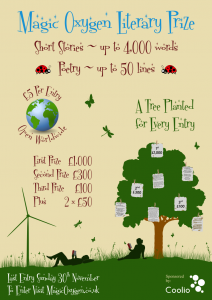 You can get a bit lost in writing a book; it’s a long process and quite isolated too. You spend a lot of time with your characters, immersed in their world. Sometimes the real world is a welcome relief, sometimes it’s an irritating distraction. At times it can seem quite distant. The story grows and develops; it follows you even when you’re not actually writing. Your protagonists and antagonists feed you information, not always at the most opportune moments (mine often decide that the best time to tell me something vital is when I’m driving, usually with nowhere I can pull over to scribble it down). It’s as if you’re living in two different realms at the same time, each as tangible as the other.
You can get a bit lost in writing a book; it’s a long process and quite isolated too. You spend a lot of time with your characters, immersed in their world. Sometimes the real world is a welcome relief, sometimes it’s an irritating distraction. At times it can seem quite distant. The story grows and develops; it follows you even when you’re not actually writing. Your protagonists and antagonists feed you information, not always at the most opportune moments (mine often decide that the best time to tell me something vital is when I’m driving, usually with nowhere I can pull over to scribble it down). It’s as if you’re living in two different realms at the same time, each as tangible as the other.
You try hard to get the writing right, to let the characters have their say but also to keep the story flowing the way it should be. You cheer when it goes well and the words pour from your fingertips; you groan, procrastinate and drink far too much tea when the plot sticks or your characters decide to go off and do their own thing without telling you. And they do do that. Without so much as a ‘by your leave’ and then you find that they’ve changed the timeline or reconfigured the plot without so much as even conferring with you or asking what you think. Well, why should they? You’re only the author after all.
Eventually, eventually you get to the end.
Of the first draft.
But that’s not the end as a writer. Because the first draft is the basis but it always needs lots of work; editing and reworking paragraphs and dialogue, adjusting timeline inconsistencies, ensuring continuity of all sorts of things from the colour of people’s eyes to who has a dog and who likes what music. And then there are the typos and the grammatical errors and the repetition of words and phrases that need to be corrected.
So you plough through again, rewriting, amending, tightening up the prose and getting it closer to how you know it needs to be. And when you’ve finished the second draft, you go through it all again a third time, just to make sure.
Phew!
You’d think that’d be it then, wouldn’t you?
Alas, no!
It’s usually when I’ve got to the end of the third draft that I ask my lovely band of pre-readers to read through it and feed back to me anything that doesn’t fit right or hold true, anything that seems superfluous or out of place, anything that they think needs altered or adjusted. With these invaluable critiques it’s time for – you’ve guessed it – draft number four.
By the end of the fourth draft, hopefully the manuscript is as near finished as possible and as good as it’s going to get. This is usually the point where, having been living and breathing it for however long and having read and reread the story countless times, I usually think “This is complete and utter rubbish. Why did I bother? I might as well just dump it in the recycling bin and do everyone a favour.”
At that point I know it’s time to consign draft four to my virtual drawer and ignore it for a month or two. When I come back to it, it’s usually not as bad as I’d thought. Usually needs a few tweaks but generally it’s OK.
That’s the scary point. Time to unleash it…


 At the risk of sounding quite crackers, my stories usually begin when a character walks into my head; they always have a story attached. They are often associated with a particular place as well. They mooch around for a bit and eventually become insistent that I write them down – often then the story continues to develop from there. The writing process occasionally drives on to the end (deadlines can be handy), but more often than not continues in fits and starts over a variable time frame.
At the risk of sounding quite crackers, my stories usually begin when a character walks into my head; they always have a story attached. They are often associated with a particular place as well. They mooch around for a bit and eventually become insistent that I write them down – often then the story continues to develop from there. The writing process occasionally drives on to the end (deadlines can be handy), but more often than not continues in fits and starts over a variable time frame. 
 Maybe I have a subversive streak, but I actually really like things that can’t be explained. Studying science at school and then physiotherapy, everything had to be proven, results had to be reliable and repeatable, all techniques had to be justified; the best and most efficient means to an end. And while this is absolutely desirable and necessary in many, many fields, it kind of knocks the wonder out of life a bit. I want the best of both worlds; I’m greedy I suppose. There are so many bizarre coincidences and odd happenings that we experience in life, and most of the time we measure them against our known parameters and come up with the most likely, logical explanation. But sometimes I think what if there is something else going on? Some other force at play? And as well as scaring myself silly, ‘what if’ is a very good place for a story to start.
Maybe I have a subversive streak, but I actually really like things that can’t be explained. Studying science at school and then physiotherapy, everything had to be proven, results had to be reliable and repeatable, all techniques had to be justified; the best and most efficient means to an end. And while this is absolutely desirable and necessary in many, many fields, it kind of knocks the wonder out of life a bit. I want the best of both worlds; I’m greedy I suppose. There are so many bizarre coincidences and odd happenings that we experience in life, and most of the time we measure them against our known parameters and come up with the most likely, logical explanation. But sometimes I think what if there is something else going on? Some other force at play? And as well as scaring myself silly, ‘what if’ is a very good place for a story to start.